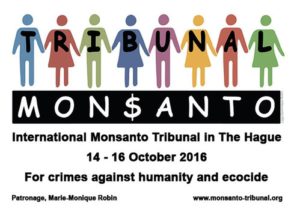 This week, the five international judges for the Monsanto Tribunal at the Hague, gave their legal opinion on the conduct of Monsanto and on the need for important changes to international laws governing multinational corporations. The judges came to the conclusion that Monsanto has “engaged in practices that have impinged on the basic human right to a healthy environment, the right to food and the right to health. Additionally, Monsanto’s conduct has a negative impact on the right of scientists to freely conduct indispensable research.”
This week, the five international judges for the Monsanto Tribunal at the Hague, gave their legal opinion on the conduct of Monsanto and on the need for important changes to international laws governing multinational corporations. The judges came to the conclusion that Monsanto has “engaged in practices that have impinged on the basic human right to a healthy environment, the right to food and the right to health. Additionally, Monsanto’s conduct has a negative impact on the right of scientists to freely conduct indispensable research.”
We agree. But that wasn’t all.
The judges said that although regulations exist to protect the environment, there exists a gap between commitments and the reality of environmental protection:
“International law should now precisely and clearly assert the protection of the environment and establish the crime of ecocide. The Tribunal concludes that if ecocide were formally recognized as a crime in international criminal law, the activities of Monsanto could possibly constitute a crime of ecocide.”
2. They also brought attention to the ever widening gap between international human rights law and corporate accountability; if action isn’t taken soon, “key questions of human and environmental rights violations will be resolved by private tribunals operating entirely outside the United Nations framework.”
3. The Tribunal also discussed holding “non-state actors responsible within international human rights law.” They believe that “multinational enterprises should be recognized as responsible actors and should be subjected to the International Criminal Court jurisdiction in case of infringement of fundamental rights.”
Important information is being shared with lawyers and organizations that represent some of Monsanto’s victims and that means it’s very possible there will be more liability cases against Monsanto and companies just like them. But, companies that cause damage to health, food, and our environment MUST be held accountable for their actions.
